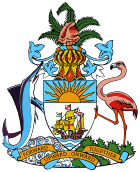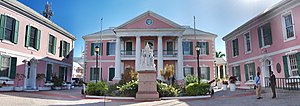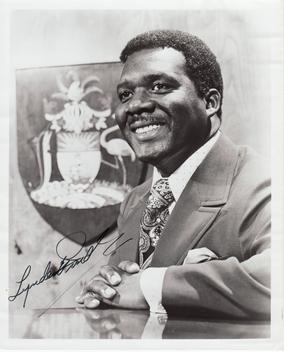
Sir Lynden Oscar Pindling, KCMG, PC, NH, JP was a Bahamian politician who is regarded by some as the "Father of the Nation", having led the Bahamas to majority rule and independence.

Perry Gladstone Christie PC, MP is a Bahamian former politician who served as prime minister of the Bahamas from 2002 to 2007 and from 2012 to 2017. He is the second longest-serving Bahamian elected parliamentarian, representing the Centreville constituency from 1977 to 2017. He is also a former athlete. His Progressive Liberal Party is the oldest Bahamian political party, holding solid majorities in the Bahamian Parliament several times in its long history.
The Free National Movement is a political party in the Bahamas formed in the early 1970s and led by Sir Cecil Wallace-Whitfield. The current leader of the party is Michael Pintard and the current deputy leader is Shanendon Cartwright.

The Progressive Liberal Party is a populist and social liberal party in the Bahamas. Philip Davis is the leader of the party.

Hubert Alexander Ingraham, PC is a Bahamian politician who was Prime Minister of the Bahamas from August 1992 to May 2002, and again from May 2007 to May 2012. He is a member of the Free National Movement Party (FNM). Prior to the 2012 election, he was the FNM's Party Leader and member of Parliament for the North Abaco constituency. He served as leader of the opposition in the House of Assembly of the Bahamas from 2005 to 2007.

Elections in the Bahamas take place in the framework of a parliamentary democracy. Since independence, voter turnout has been generally high in national elections, with a low of 87.9% in 1987 and a high of 98.5% in 1997. The current Prime Minister is The Hon. Philip Davis. The electorate is less than half of citizenry.

The Bahamas Democratic Movement (BDM) is a liberal-populist political party in the Bahamas representing the interests of young people.

Theodore Brent Symonette is a Bahamian businessman and Free National Movement politician who was the Member of Parliament (MP) for St. Anne's from 2007 to 2012 and 2017 to 2021. In his first term, he served as Deputy Prime Minister to Hubert Ingraham and Minister of Foreign Affairs. In his second, he was the Minister of Financial Services, Trade and Industry and Immigration from 2017 to 2019.

General elections were held in the Bahamas on 2 May 2007. The result was an opposition victory, with the Free National Movement, led by former Prime Minister Hubert Ingraham, claiming 23 of the 41 seats. Incumbent Prime Minister Perry Christie conceded defeat in a phone call to his rival. Ingraham was sworn into the office of Prime Minister on 4 May.

General elections were held in the Bahamas on 2 May 2002. The opposition Progressive Liberal Party (PLP) won 29 of the 40 seats in the House of Assembly to defeat the governing Free National Movement (FNM). Voter turnout was 90%.
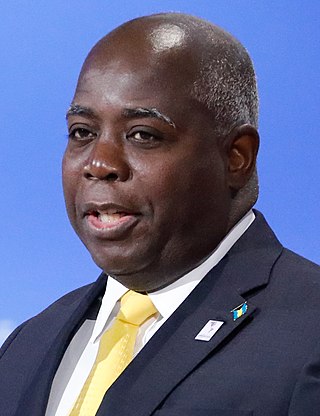
Philip Edward "Brave" Davis is a Bahamian politician serving as the prime minister of the Bahamas since 2021. He was the Member of Parliament (MP) for Cat Island, Rum Cay & San Salvador from 1992 to 1997 and returned to the seat in May 2002, which he still represents.

Orville Alton Thompson "Tommy" Turnquest, CBE is a Bahamian politician.

General elections were held in the Bahamas on 19 August 1992. The result was a victory for the opposition Free National Movement (FNM), which received 55% of the vote and won 33 of the 49 seats in the House of Assembly, while the ruling Progressive Liberal Party (PLP) lost nearly half their seats, winning only 16.
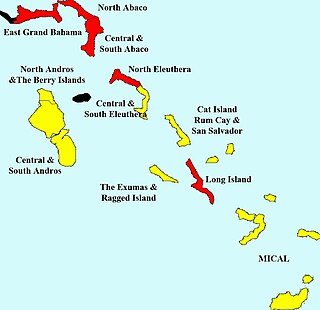
General elections were held in the Bahamas on 7 May 2012. They were the first general election in which a third party offered a full slate of candidates alongside the two major parties, the Free National Movement and the Progressive Liberal Party (PLP). The result was a victory for the opposition PLP, whose leader Perry Christie became prime minister.

Hubert Alexander Minnis, ON is a Bahamian politician and doctor who served as prime minister of the Bahamas from May 2017 to 16 September 2021. Minnis is the former leader of the Free National Movement, the former governing party, and the Member of Parliament for the New Providence constituency of Killarney. First elected to the legislature in the 2007 election, he succeeded Hubert Ingraham as party leader following the party's defeat in the 2012 election.

General elections were held in the Bahamas on 10 May 2017. The elected members of the House of Assembly then elected the Prime Minister.

Arinthia Santina Komolafe is a Bahamian politician who was elected the Leader of the Democratic National Alliance (DNA), one of the three main political parties in the Bahamas, on 24 October 2017.
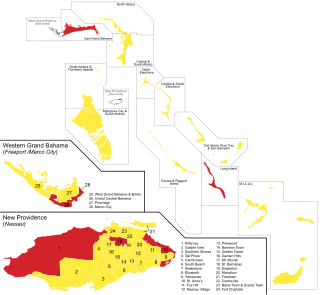
General elections were held in the Bahamas on 16 September 2021 to elect all 38 members of the House of Assembly.
Sir Cecil Vincent Wallace Whitfield was a Bahamian politician who was a founding member and the first leader of the Free National Movement political party. He also served as a Minister in the cabinet of Lynden Pindling from 1967 to 1970 and as a longtime member of the Bahamian Parliament.
Edison McGinnis Key is a Bahamian politician and former Member of Parliament. He is best known for representing Central and South Abaco as a Member of Parliament. He served in various capacities during his 40-year political career, including two terms as a Senator and as chairman of the Bahamas Telecommunications Corporation (BaTelCo) and chair of the Bahamas Agricultural and Industrial Corporation (BAIC).
